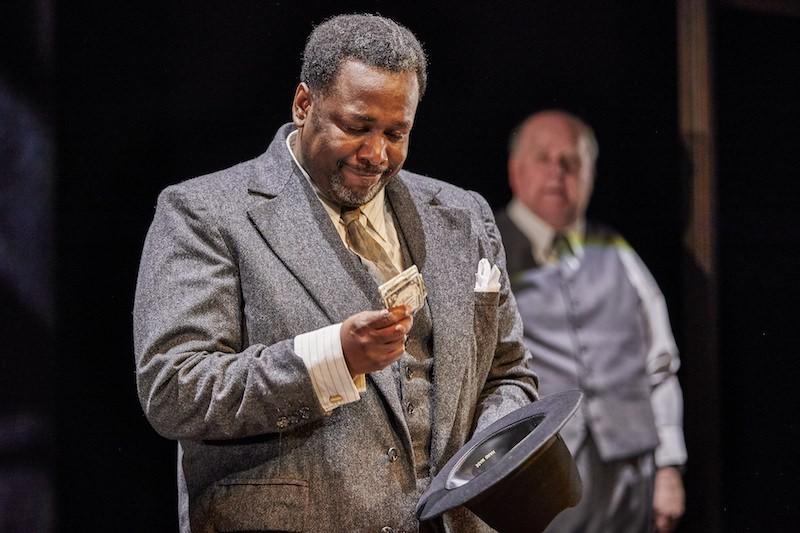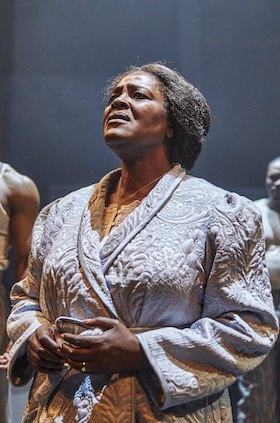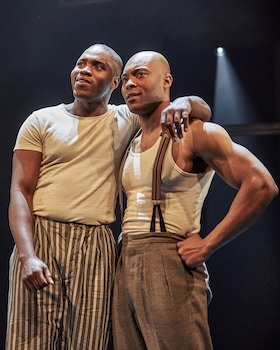Death of a Salesman, Young Vic review - new-minted revival of a masterpiece | reviews, news & interviews
Death of a Salesman, Young Vic review - new-minted revival of a masterpiece
Death of a Salesman, Young Vic review - new-minted revival of a masterpiece
Arthur Miller's tragedy from an African-American viewpoint

The Young Vic, a welcoming theatre with a culturally diverse audience, has been home to memorable Miller revivals before, notably Ivo van Hove's emotionally shattering, stripped-back A View From the Bridge in 2014.
Now, 70 years after its first performance at the Morosco Theatre in New York, Miller's masterpiece joins a London-wide celebration of his work. All My Sons is playing up the road at the Old Vic, where The American Clock ran earlier this year, The Price has just closed at Wyndham's Theatre and The Crucible will be at the Yard until May 11th.
 Miller once said that he thought Elia Kazan, the play's first director, "had it right from the beginning. He said, 'It's a love story'". That is an element which comes out strongly in Marianne Elliott and Miranda Cromwell's production, which follows Elliott's previous successes with American classics (assisted by Cromwell), Angels in America and the brilliant, gender-altered Company. Wendell Pierce as failing salesman Willy Loman and Arinzé Kene as his feckless son Biff painfully play out their disappointment with each other, mixing brutal accusations with desperate attempts at mutual protection before a tearful recognition of respect.
Miller once said that he thought Elia Kazan, the play's first director, "had it right from the beginning. He said, 'It's a love story'". That is an element which comes out strongly in Marianne Elliott and Miranda Cromwell's production, which follows Elliott's previous successes with American classics (assisted by Cromwell), Angels in America and the brilliant, gender-altered Company. Wendell Pierce as failing salesman Willy Loman and Arinzé Kene as his feckless son Biff painfully play out their disappointment with each other, mixing brutal accusations with desperate attempts at mutual protection before a tearful recognition of respect.
Motherly, selfless Linda Loman (strong, gently demonstrative Sharon D. Clarke, pictured right) copes with three immature men: her dreamer husband and two sons, thieving, ex-high school football star Biff and philanderer Happy. The emphasis is less on the tragedy of Willy failing to live the capitalist American dream than on a family attempting to find individual and group salvation in a tough world. Pierce's Willy is not so much defeated by the thankless task of selling (what we are not told; Miller said, "himself") as the tension between hopeless aspiration and cold reality. Ultimately - and this too is especially clear in Kene's glittering performance, angry, broken then triumphantly clear-headed - Biff alone learns to know himself. Money-making city life is not for him and he prepares to return to working on a farm. Happy, attractively played by Martins Imhangbe (Pictured below, on the left with Kene), seems bent on repeating his father's life of self-delusion.
 Does it make any difference that the Lomans are an African-American family? In some ways, very little. There have been African-American productions in the United States, the first in Baltimore in the early 1970s. Miller said, "When the acting is terrific, the whole thing works. But that's true whether they're white or black or Chinese." This cast come with exemplary experience, including Pierce in The Wire, Clarke having recently won an Olivier for Caroline, or Change and Kene fresh from the hit play Misty, which he also wrote, and they make a fine ensemble. Although Howard, Willy's prosperous, unsympathetic boss is white and the struggles of a financially strapped family might seem one stage harder if they are black, Willy's dead, self-satisfied brother Ben (Joseph Mydell, sleek in spotless white suit) apparently cracked the system and made a fortune. Willy treats him with something close to hero worship.
Does it make any difference that the Lomans are an African-American family? In some ways, very little. There have been African-American productions in the United States, the first in Baltimore in the early 1970s. Miller said, "When the acting is terrific, the whole thing works. But that's true whether they're white or black or Chinese." This cast come with exemplary experience, including Pierce in The Wire, Clarke having recently won an Olivier for Caroline, or Change and Kene fresh from the hit play Misty, which he also wrote, and they make a fine ensemble. Although Howard, Willy's prosperous, unsympathetic boss is white and the struggles of a financially strapped family might seem one stage harder if they are black, Willy's dead, self-satisfied brother Ben (Joseph Mydell, sleek in spotless white suit) apparently cracked the system and made a fortune. Willy treats him with something close to hero worship.
Miller's original title for Death of a Salesman was The Inside of His Head and the whole play could be seen as a lyrical poem. In his stress-induced confusion, Willy relives episodes from the past, the happiest of which are here differentiated by stylised movements. Biff and Happy pose together, ideal young sportsmen, while geeky Bernard next door (later a successful lawyer) is by contrast especially gawky in Willy's competitive imagination. Anna Fleischle's abstract, flexible set can provide different areas, then and now, real and imagined, inside and outside, somewhere and nowhere.
Although absolute emotional depths are not always reached in this production, the last few minutes, in which the magnificent Sharon D Clarke and Arinzé Kene duet the Gospel hymn "When the Trumpet Sounds", are overwhelming. The sense of waste, the agony of loss and disappointment are summed up in a triumphant celebration of survival. This is definitely particular to the African-American setting.
The future of Arts Journalism
You can stop theartsdesk.com closing!
We urgently need financing to survive. Our fundraising drive has thus far raised £49,000 but we need to reach £100,000 or we will be forced to close. Please contribute here: https://gofund.me/c3f6033d
And if you can forward this information to anyone who might assist, we’d be grateful.

Subscribe to theartsdesk.com
Thank you for continuing to read our work on theartsdesk.com. For unlimited access to every article in its entirety, including our archive of more than 15,000 pieces, we're asking for £5 per month or £40 per year. We feel it's a very good deal, and hope you do too.
To take a subscription now simply click here.
And if you're looking for that extra gift for a friend or family member, why not treat them to a theartsdesk.com gift subscription?
more Theatre
 Mary Page Marlowe, Old Vic review - a starry portrait of a splintered life
Tracy Letts's Off Broadway play makes a shimmeringly powerful London debut
Mary Page Marlowe, Old Vic review - a starry portrait of a splintered life
Tracy Letts's Off Broadway play makes a shimmeringly powerful London debut
 Little Brother, Soho Theatre review - light, bright but emotionally true
This Verity Bargate Award-winning dramedy is entertaining as well as thought provoking
Little Brother, Soho Theatre review - light, bright but emotionally true
This Verity Bargate Award-winning dramedy is entertaining as well as thought provoking
 The Unbelievers, Royal Court Theatre - grimly compelling, powerfully performed
Nick Payne's new play is amongst his best
The Unbelievers, Royal Court Theatre - grimly compelling, powerfully performed
Nick Payne's new play is amongst his best
 The Maids, Donmar Warehouse review - vibrant cast lost in a spectacular-looking fever dream
Kip Williams revises Genet, with little gained in the update except eye-popping visuals
The Maids, Donmar Warehouse review - vibrant cast lost in a spectacular-looking fever dream
Kip Williams revises Genet, with little gained in the update except eye-popping visuals
 Ragdoll, Jermyn Street Theatre review - compelling and emotionally truthful
Katherine Moar returns with a Patty Hearst-inspired follow up to her debut hit 'Farm Hall'
Ragdoll, Jermyn Street Theatre review - compelling and emotionally truthful
Katherine Moar returns with a Patty Hearst-inspired follow up to her debut hit 'Farm Hall'
 Troilus and Cressida, Globe Theatre review - a 'problem play' with added problems
Raucous and carnivalesque, but also ugly and incomprehensible
Troilus and Cressida, Globe Theatre review - a 'problem play' with added problems
Raucous and carnivalesque, but also ugly and incomprehensible
 Clarkston, Trafalgar Theatre review - two lads on a road to nowhere
Netflix star, Joe Locke, is the selling point of a production that needs one
Clarkston, Trafalgar Theatre review - two lads on a road to nowhere
Netflix star, Joe Locke, is the selling point of a production that needs one
 Ghost Stories, Peacock Theatre review - spirited staging but short on scares
Impressive spectacle saves an ageing show in an unsuitable venue
Ghost Stories, Peacock Theatre review - spirited staging but short on scares
Impressive spectacle saves an ageing show in an unsuitable venue
 Hamlet, National Theatre review - turning tragedy to comedy is no joke
Hiran Abeyeskera’s childlike prince falls flat in a mixed production
Hamlet, National Theatre review - turning tragedy to comedy is no joke
Hiran Abeyeskera’s childlike prince falls flat in a mixed production
 Rohtko, Barbican review - postmodern meditation on fake and authentic art is less than the sum of its parts
Łukasz Twarkowski's production dazzles without illuminating
Rohtko, Barbican review - postmodern meditation on fake and authentic art is less than the sum of its parts
Łukasz Twarkowski's production dazzles without illuminating
 Lee, Park Theatre review - Lee Krasner looks back on her life as an artist
Informative and interesting, the play's format limits its potential
Lee, Park Theatre review - Lee Krasner looks back on her life as an artist
Informative and interesting, the play's format limits its potential
 Measure for Measure, RSC, Stratford review - 'problem play' has no problem with relevance
Shakespeare, in this adaptation, is at his most perceptive
Measure for Measure, RSC, Stratford review - 'problem play' has no problem with relevance
Shakespeare, in this adaptation, is at his most perceptive

Add comment